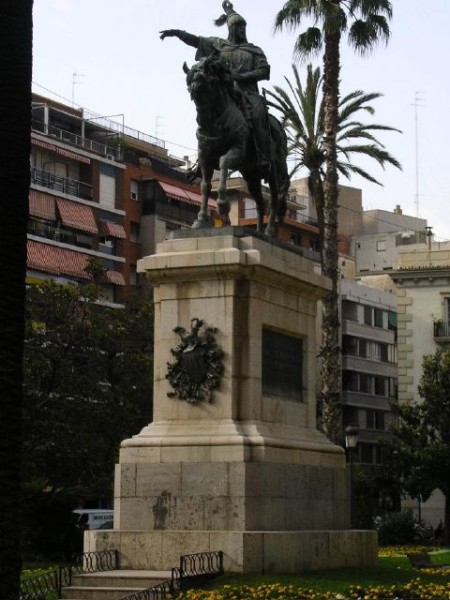The name of King James (Jaime in Spanish and Jaume in Valencian) is one that appears everywhere in and is as fundamental to Valencia as Arthur or Henry V are to English history.
His father, King Peter (Pedro) of Aragon was killed at the Battle of Muret in 1213, defending his vassal the Count of Toulouse from Pope Innocent III’s crusade against the Albigensian heresy, when thousands of Cathars were burnt at the stake to ‘purify’ the Catholic Church.
James was only 5 when his father died, having been born in Montpellier, France on February 12th 1208. Before his father’s death, the boy had been practically a prisoner of Simon de Monfort, 5th Earl of Leicester, who was the Pope’s military commander on the crusade.
King Peter had tried to appease Simon by arranging a marriage between their children and entrusting James to his care, a typical form of hostage taking in those days. In 1214 however, pressure from the Aragonese and Catalans forced the Pope to return James to his family.
James was looked after by Guillen de Monredon, the head of the Knights Templar in Spain and was brought to Zaragoza in 1216.
When he came of age, James, a tall, strong, powerful man, set about building himself a Kingdom. Having failed to form an alliance with Navarre he turned his attention south and east, conquering the Balearic Islands between 1228 and 1232 and Valencia in September 1238 after a long campaign against the Moors.
Despite failing initially to take Peñiscola, he fought battles and waged sieges at Morella, Xativa, El Puig, Alcira, Biar and Burriana.
His dreams of maintaining his father’s lands in France were finally abandoned at the Treaty of Corbeil when he and King Louis IX of France agreed to stay on their own sides of the Pyrenees.
He married three times, firstly to Leonor, daughter of King Alfonso VIII of Castille, on whose behalf he warred against the Moors in Murcia after conquering Valencia. Later he had the marriage annulled and wed Violant, daughter of King Andrew II of Hungary and finally Teresa Gil de Vidaure, who he abandoned when she became infected with leprosy.
He had 13 legitimate children from his three wives, including 10 from the second, as well as several illegitimate ones, which should be seen in the cultural and sociological context of the time and blah blah blah.
He produced a chronicle of his own life, ‘Llibre Dels Feits’ in the Catalan language, which is the first self-chronicle of a Christian king. The ‘Book of Deeds’ expresses concepts of the power and purpose of monarchy, examples of loyalty and treachery under feudalism and the growth of national sentiment based on homeland, language and culture.
In 1269 he participated in an aborted crusade to the Holy Land and his later years were largely taken up by attempting to maintain order among his sons, who frequently warred against each other, such as the case of Fernan Sanchez, one of his illegitimate sons, who was slain by his legitimate son Peter. Well, all families have their little problems after all.
James finally fell gravely ill at Alcira and intended to retire to the Catalan monastery of Poblet, now the traditional burial place of the Catalan Kings and a symbol of Catalan nationalism, but before he could get there he died in Valencia on July 7th 1276 and was then buried at Poblet.
He is considered the father of the Valencian Kingdom and Castellón University is named after him.
His statue stands in the Parterre Garden, behind the oldest of the Corte Inglés Department stores.


